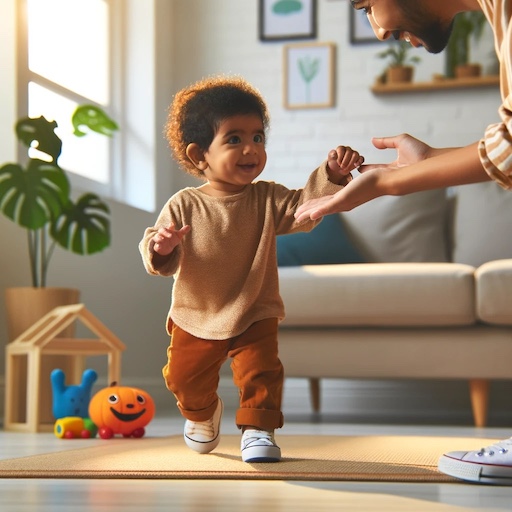Important Milestones For Your Child By Fifteen Months
Introduction
By the age of 15 months, children are reaching exciting new milestones that give us insight into their development. From copying playmates to showing affection, these milestones reflect significant growth in their social, emotional, cognitive, and physical abilities. The CDC's Milestone Tracker mobile app offers a comprehensive way for parents and caregivers to track these developments, celebrating each new achievement while ensuring their child is progressing well. Recognizing these milestones not only helps in assessing your child's growth but also in fostering an environment that encourages their continued learning and exploration.

Key Milestones for 15-Month-Old Children
At 15 months, children are blossoming in various aspects of their growth. They start to mirror the actions of others, express their likes, and take their first independent steps. Here are the primary milestones for children at this exciting age:
Social/Emotional Milestones
- Imitates play actions of peers, such as emptying and filling containers, highlighting early social learning.
- Exhibits preference by showing toys they favor, reflecting their developing likes and dislikes.
- Expresses joy through clapping, an early sign of understanding and responding to positive stimuli.
- Displays affection with hugs or kisses, showing bonds of attachment and love.
Language/Communication Milestones
- Attempts to say words beyond the basics of “mama” or “dada,” such as attempts for “ball” or “dog,” marking speech development.
- Recognizes and looks at familiar objects when named, showing improved understanding and language connection.
- Responds to simple verbal commands paired with gestures, indicating a blend of understanding and action.
- Uses pointing as a means to request or seek assistance, a vital communication skill.
Cognitive Milestones
- Begins to use objects correctly, such as pretending to talk on a toy phone, indicating imaginative play and understanding of object use.
- Stacks objects, such as blocks, demonstrating early problem-solving and motor skills.
Movement/Physical Development Milestones
- Walks a few steps independently, showcasing significant physical development and mobility.
- Feeds themselves with fingers, showing growing independence and fine motor skill enhancement.

Diving Deeper: Unveiling Your 15-Month-Old's Development
Social/Emotional Growth
At 15 months, children start mimicking the actions of their peers, like sharing or taking turns with toys. This imitative play not only fosters social skills but also aids in emotional development. Their affectionate displays toward parents or toys, such as hugs and cuddles, highlight their capacity for love and attachment.
Language and Communication Evolution
Children this age begin to express themselves with simple words beyond "mama" and "dada," attempting to name objects or express desires. Recognizing objects upon hearing their names and following combined verbal and gestural directions illustrate burgeoning communication skills. Pointing to request something or seek help further underscores their growing ability to interact meaningfully with their environment.
Cognitive Development Insights
The cognitive landscape at 15 months includes using objects correctly, like pretending to speak on a phone or drink from a cup, showcasing imaginative play and an understanding of everyday items. The ability to stack two objects reveals early problem-solving skills and hand-eye coordination.
Advancements in Movement and Physical Abilities
Marking a significant physical milestone, 15-month-olds start taking independent steps, a momentous leap towards walking unaided. Self-feeding using fingers and attempting to use utensils reflect growing independence and fine motor skill development. These physical achievements underscore their journey towards autonomy.
When You Have Concerns About Your Child's Development
While tracking developmental milestones provides valuable insights into your baby's growth, it's crucial to remember that these milestones are not set in stone. Most children (about 75%) reach these milestones by a certain age, but many healthy and happy babies develop at their own unique pace. Some may achieve certain skills more quickly, while others take a bit longer, and that's perfectly normal.
As the person who knows your baby best, your observations are invaluable. When speaking with your child’s doctor, consider discussing:
- Activities and routines you and your baby enjoy together.
- Your baby's favorite ways to play and interact.
- Any behaviors or skills that seem unusual or concerning to you.
- If your baby seems to have lost any skills they once had.
- Any special healthcare needs your baby might have, including if they were born prematurely.
It’s always better to address any concerns early. If you're worried about your baby's development or if they're not meeting the milestones as expected, don't hesitate to talk to your pediatrician. They can provide guidance, support, and, if necessary, further evaluation to ensure your baby gets the best start possible. Remember, you're doing a great job, and seeking advice or clarification is part of ensuring the well-being of your precious little one.
Nurturing Your 15-Month-Old: Practical Parenting Tips
As your toddler steps into the 15-month mark, their exploration and curiosity reach new heights. Here are some effective strategies to support their development:
- Encourage Imitative Play: Play alongside your child, demonstrating simple actions they can mimic, such as pretending to talk on a phone or cuddling a doll. This not only enhances their social and emotional skills but also fosters cognitive growth.
- Expand Their Vocabulary: Introduce new words during play and daily routines, emphasizing objects and actions to build their language skills. Celebrate their attempts to speak, repeating and expanding on their words to enhance understanding and expression.
- Promote Independent Movement: Create safe spaces for your child to walk and explore independently. Encourage their steps and celebrate their successes, offering support as they navigate their physical abilities.
- Facilitate Problem-Solving: Provide toys and activities that challenge their problem-solving skills, like simple puzzles or blocks to stack. Guiding them through these activities can stimulate cognitive development and hand-eye coordination.
- Support Self-Feeding: Offer finger foods that encourage self-feeding, aiding in the development of fine motor skills and independence. Always supervise meal times to ensure safety.
- Build on Communication: Engage in activities that require simple choices, encouraging your child to use gestures or words to communicate their preferences. This reinforces their language development and decision-making skills.
- Foster Emotional Connections: Show affection and praise to reinforce positive behaviors and achievements. Emotional support and recognition are vital for their social and emotional development.
- Establish Routines: Consistent routines for meals, sleep, and play help create a sense of security and structure, facilitating easier transitions and adjustments to new experiences.
Every child develops at their own pace, but these strategies can help support your 15-month-old's growth in meaningful ways. Always consult with healthcare professionals for personalized advice tailored to your child's needs.

Summary and Resources
By 15 months, your child showcases significant growth across all developmental domains, marking an exciting phase of discovery and learning. From taking their first independent steps to showing affection, each milestone enriches their journey and ours. Engaging with your child through this developmental stage brings joy and a deeper connection.
Supporting our little ones with patience, encouragement, and responsive care cultivates a nurturing environment for their continued growth. It's essential to embrace and support their unique developmental timeline, celebrating each achievement along the way.
The CDC's Milestone Tracker app remains a vital resource for tracking developmental progress, providing personalized tips, and accessing valuable support materials. This tool is designed to guide parents and caregivers through the nuances of developmental milestones with confidence and clarity.
Discover more about how to support your child's developmental journey by visiting the CDC Milestone Tracker page and downloading the app. Together, we can ensure that every child has the support they need to flourish during these formative months and beyond.
